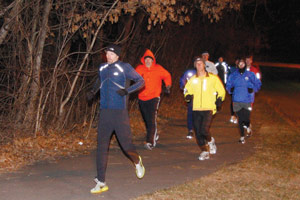When Dan Mason was diagnosed with diabetes five years ago, he decided to take charge. At 53, Mason joined a fitness program at the YWCA of Asheville that specifically targets diabetes.

"I just started going," Mason explains. And along the way, a man who would get short of breath just going to the mailbox set his sights on walking some local 5K events. In his first foray, the Asheville Citizen-Times 5K this past August, Mason finished dead last, though he did beat his target time of one hour.
Mason now walks seven to 10 miles a day and has participated in other 5K races, including one in which he placed in his age division. Along the way, he's been able to ditch several medications, including prescriptions for diabetes and high cholesterol. And with the raging national health-reform debate highlighting the high cost of meds, that alone might seem reason enough to get fit.
Personal-fitness trainer Wendy Roche says she's seen the same thing with a client who was unhappy about how many prescriptions she had.
"Obviously, she's spending beaucoup on that alone, and on doctors' visits and all these other after-the-fact things. She can control this, and it means a lot to her just to get in shape and get off all these medications," says Roche .
Taking charge
What with a struggling economy, the health-care-reform debate and high unemployment, this society has a lot of balls up in the air. But for some people, personal fitness represents one piece of the puzzle that they can take charge of.
"That's exactly what's happened," says fitness coach Corey Duvall. "They've increased self-esteem and therefore been able to improve their job performance. We have one woman who is a contractor, and [business has] been slowing down. But she's been with us since August and really improved her self-confidence, which she thinks improves her confidence to the client and getting those bids."
Duvall teaches CrossFit, a customized coaching system that seeks to target every aspect of fitness, from strength to balance to agility. This, he says, reduces the likelihood of having the kinds of accidents that sideline people who can't afford to miss work, while helping combat fatigue due to the daily grind.
"You know, you sit and work, your back is stiff and achy," says Duvall. "Well, if you get in and start to improve that, now you don't wake up anymore dreading going in and sitting at the desk. Instead of concentrating on that sore, injured area, you're able to concentrate on your work."
The traditional wisdom concerning a stitch in time and an ounce of prevention applies equally to staying fit. Even in the best of times, going to the doctor or emergency room isn't high on most folks' list of fun things to do, and with the economy still uncertain, staying fit can spare you the fiscal burden of emergency care.
"The simple fact is that when you use the body, it knows to heal faster," says local chiropractor Jennifer Liming. Meanwhile, boosting your immune system makes it easier to avoid Asheville residents' annual winter funk.
"When you exercise, you improve the endorphin levels that are in your bloodstream, and those endorphins react right on your immune cells to make them more active and functional," Duvall notes. "So when you are exposed to all those germs at the grocery store, they fight off that infection before it even gets started."
Group support
But getting fit doesn't have to mean a gym membership or a personal trainer. The Asheville area offers abundant low-cost opportunities — and groups ready to help you get there.
"It's so much easier to step out of your door and run than it is to go to the gym and try to get on a treadmill. It's fairly cheap compared to other sports," says store manager Jane Roane of Jus' Running, talking about the popularity of the twice-weekly group runs offered by the Merrimon Avenue business. The social aspect and the support of fellow runners help keep motivation honed, she says.
Not ready for a run? There are local groups promoting just about any form of fitness imaginable: running, hiking, several types of biking and much more. The Carolina Mountain Club, for instance, organizes weekly hikes for a membership whose average age is 50.
"Hiking is one of the cheapest sports there is," notes club member (and Xpress outdoors writer) Danny Bernstein. Still, she says, most club members round out their fitness regimen with other practices such as yoga or Pilates.
"It's the reward: You stay fit so you can go hiking," Bernstein observes. "Hiking encourages a healthy life. It encourages you to stay fit when you can't hike."
Roche agrees. "Exercise is crucial," she maintains. "OK, so a gym membership may be too much; a personal trainer may be too much. But there are so many little tweaks you can change and add into your day. Parking farther away from the door; taking the stairs. Any time at all you can add a little more movement, the better."
Liming, too, endorses a less-is-more approach. "If what you did for exercise was just a good 20 minutes of stretching, that's very good for your muscles," she says, offering her own tip for folks who want to start getting fit: "Find something you enjoy."
Brian Postelle can be reached at bpostelle@mountainx.com or at 251-1333, ext. 153.



I find it humorous that this article cites “CrossFit” as a fitness plan that “reduces the likelihood of having the kinds of accidents that sideline people who can’t afford to miss work”. Check out the “CrossFit” website message boards… more specifically the “injuries” forum.
isn’t CrossFit a cult?
Pretty much.
Even the “members” themselves refer to “drinking the kool-aid” when they join CultFit.
They also consider developing “Rhabdo” as a badge of honor. There’s some health and wellness for you.